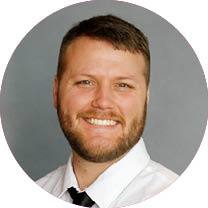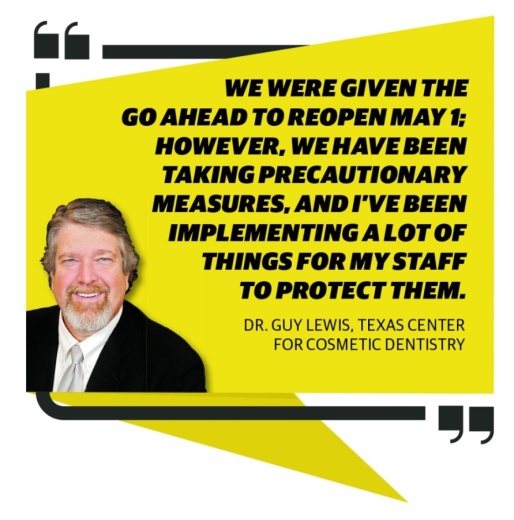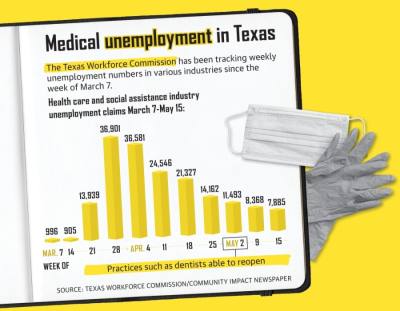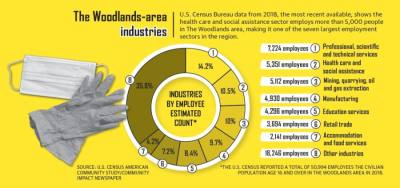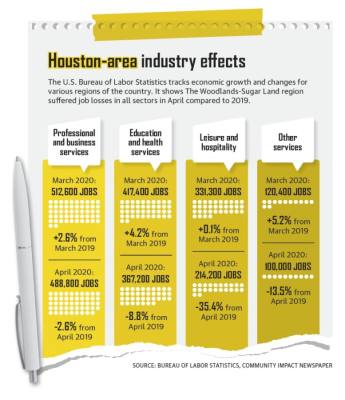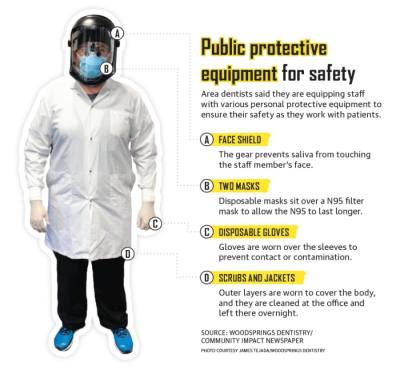“We had just started to get to a pace to stay steadily busy. ... We were shut down essentially for around two months,” said Dr. James Tejada, who owns and operates WoodSprings Dentistry on Gosling Road. “We still had rent; we still had our monthly operating expenses for our software and equipment. Financially we are very blessed, but I was very concerned about my staff.”
Businesses that offer nonemergency operations, such as dentists, were able to reopen May 1. Despite this, some chose to remain closed until they were able to secure the proper personal protective equipment and ensure they were able to operate in a safe capacity for both their employees and patients.
The Texas Medical Association on May 20 released the results of a survey among private practices showing of the participating practices, 63% of physicians reported a decrease in revenue of half or more since the pandemic. Cash flow problems forced nearly two-thirds of doctors to apply for small-business loans and other financial assistance as well, with mixed results.
“I did apply for an SBA loan March 5 and still have not received any help,” said Cassie Clark, owner of Clark Hearing in Shenandoah.
Statewide, there were 7,885 unemployment claims from the most recent reporting period—May 9-16—in the health care and social assistance industries, making the category one of the five most affected, according to the Texas Workforce Commission. From April 8-May 9, there were 6,281 overall unemployment claims in the seven ZIP codes that make up The Woodlands area.
According to information from the U.S. Census Bureau, in 2018—the most recent year available—the health care and social assistance sector was the second largest sector in The Woodlands area, providing more than 5,000 jobs.
As many health care providers reopen, medical business owners still have concerns moving forward aside from just operating at limited capacity such as obtaining personal protective equipment and keeping up with increasing prices of medical equipment.
Closing early, extra cleaning
The American Dental Association recommended dentists close before it was mandated by the state in March, according to James Tejada.
James Tejada and his wife, Samantha, opened their office in late December 2019. The Tejadas said they have a small staff with four employees, all of whom they believe are happy to be back working.
Dr. Guy Lewis, owner of Texas Center for Cosmetic Dentistry, said during the shutdown his office only saw the most dire of dental emergencies, which meant his business was at a standstill for around 2 1/2 months before reopening May 18.
“A lot of my practice is cleanings, which are not life-or-death essential for most people,” Lewis said. “We were given the go ahead to reopen May 1; however, we have been taking precautionary measures, and I’ve been implementing a lot of things for my staff to protect them.”
Both dentistries are taking extra precautions to protect their staff and patients. Lewis said patients will only be allowed in the lobby in a limited capacity, and the building will be outfitted with ultraviolet filters and air purifiers to clean the air circulating through rooms. Staff members are wearing N95 masks with an additional mask placed over them, as the N95 masks are hard to come by at this time, he said.
“We are also wearing face shields, which protect the face from splatter,” Lewis said. “We are wearing caps on our heads to cover our hair and disposable gowns, and I’ve ordered a lot of lab jackets and scrub pants so we can change those out for every patient. We have to wash those every day.”
Lewis said he is using a disinfectant mist daily to sanitize the patient rooms and equipment to get places that wipes could not reach.
The Tejadas said they are taking similar precautions, though they are asking patients with appointments to wait in their vehicles rather than the lobby area. When patients are brought in, their temperatures are taken, and they are screened prior to entering. Samantha Tejada said patients are required to use hand sanitizer, and a staff member will open doors to limit contact. WoodSprings Dentistry is also pushing for paperless billing.
“As long as the patients are OK with it, we are trying to collect payment over the phone so they don’t have to come in here and use the machine or anything,” Samantha Tejada said.
Moving forward, a potential difficulty for dental practices could be securing additional protective equipment. Lewis said he could see limited access to supplies preventing other offices from opening in a timely manner, and the Tejadas said it is a concern for their business.
“That’s probably the top fear we have right now,” James Tejada said. “I don’t think it’s going to be an issue, and I’m hoping as time goes on, production is going to ramp up. I think right now, they’re trying to preserve enough for the medical fields in case of a second round [of coronavirus cases]. It’s challenging to get them, and the prices have inflated significantly. We can’t sacrifice that; we don’t have the option.”
The Tejadas said medical provider 3M has not been releasing equipment to dental vendors at this time, but they hoped for more equipment to be released closer before summer.
Changes while open
Other medical businesses have been able to remain open, although in a limited capacity.
Among them is Yee Plastic Surgery, owned and operated by Dr. Hilton Yee. Yee said his business was able to remain open due to offering operations for skin cancer patients.
As of May 22, Yee said he is beginning to perform regular cosmetic operations again in a limited capacity, and both his staff and patients are required to follow guidelines including wearing a mask and taking part in a questionnaire about any potential coronavirus symptoms they may have.
Along with providing masks for his staff, Yee has been providing masks for his patients for them to be seen.•Cleaning the offices has also become more strict, according to Yee. Yee and his staff are now constantly washing their hands before, during and after interactions with patients as well.
"We also have to have special permission now,” Yee said. “Because of the coronavirus, patients who come in can get it from other patients they sit next to or from staff. Now they have to sign a waiver saying they know coronavirus is present and there is a possibility that you can catch it.”
Because of the restrictions in place by the state, Yee said his business was down at least 50% despite being open the entire time.
Moving forward, Yee said the small supply of protective equipment he has for his staff and patients will not last long, and due to the current demand, he is unsure of how accessible it will be to replace. •“Sometimes, I have to go scrounging around or begging,” he said. “There are a lot of devices [for taking temperatures] on the internet that are $70, but they’re unreliable. I had to go look for a more reliable device, and it took a while to get one. ... They are like $700 each.”
Caring for the elderly
Some medical businesses such as Clark Hearing in Shenandoah, which provides hearing aids and supplies, primarily focus on elderly clients. As of May 6, Clark said she was beginning to reopen two of her three stores, which had to be closed due to being in shared office spaces. Her store in Magnolia was able to remain open, however, although social distancing restrictions forced appointments to be more spread out.
To adapt, Clark said her business switched to a curbside approach, although it still harbored some difficulties.
Without specific directions, Clark said she and her staff are following general guidelines for public health care as listed by the Centers for Disease Control and Prevention.
“We are very hands on, and about 75% of our clientele are the elderly; a lot of them are in nursing homes so we can’t see them,” Clark said. “We are considered essential, but it is like a dentist’s office. It’s only for emergency situations. There is nothing from the governor’s office that’s particular to our industry; it’s a very gray area.”


